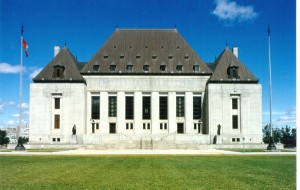 In school, we learn that the Supreme Court of Canada (SCC) is the ‘highest court’ in the land (and has been since 1949). We learn that lower court decisions can be “appealed” to the SCC, and we hear about all kinds of important decisions coming from the Court. But, for most of us, the exact process of getting to the SCC, and whether that is even possible, is a bit of mystery. Add to that the influence from television crime shows, which seem to imply that anything and everything can and should be appealed …. and it is no surprise that most of us a little fuzzy on the issue of appeals.
In school, we learn that the Supreme Court of Canada (SCC) is the ‘highest court’ in the land (and has been since 1949). We learn that lower court decisions can be “appealed” to the SCC, and we hear about all kinds of important decisions coming from the Court. But, for most of us, the exact process of getting to the SCC, and whether that is even possible, is a bit of mystery. Add to that the influence from television crime shows, which seem to imply that anything and everything can and should be appealed …. and it is no surprise that most of us a little fuzzy on the issue of appeals.
Yesterday, in Edmonton, the question of appeals to the SCC formed part of the most talked-about story of the day: Baby M. In that case, the Alberta Court of Appeal had decided that M should be taken off of life support. M’s parents asked the SCC to stay that decision (i.e.: keep M on life support) in order to give them time to apply to appeal the case to the SCC. The SCC refused.
So what does all of that mean?
Most cases come before the SCC in a formalized procedure, beginning with a judgment at trial, which is then appealed to a Court of Appeal. If the litigants are of the opinion that a mistake was made at the appeal level, then one or both may ask for ‘leave to appeal’ the matter to the SCC. This happens about 600 per year. This process of leave is a surprise to many people, who sometimes think that there is an automatic ‘right’ to appeal to the SCC. There isn’t (except for a few exceptions). And leave is not that easy to get: the SCC only grants it about 80 times per year.
During the leave process, a panel of SCC judges (usually 3) does a little mini-analysis to decide if it should even hear the appeal (so it a 2-step process). More specifically, the SCC applies the criteria found in the Supreme Court Act, which states that an application for leave to appeal may be granted if the case:
- raises an issue of public importance (in other words, the case must raise an issue that goes beyond the immediate interests of the parties to the case); and
- should be decided by the Supreme Court of Canada.
But surely the Baby M case is of public importance?
Well, yes. But the SCC can refuse leave if it feels that the law in question, as socially important as it may be, has already been decided (especially if it was previously examined by the SCC itself) and there is nothing else to say on the issue. Sometimes, however, even though the SCC has already made a decision about the topic in question, it will nonetheless grant leave. This can occur, for example, when the SCC feels that the fabric of society has significantly changed since it last gave a decision on the issue.
In this case, we were not yet at the “leave” stage per se. The court was being asked for a stay in order to give baby M’s parents’ time to apply for leave to have the case heard at the SCC. But, since the stay was denied, and Baby M died, there will now no longer be a case to hear, and no need to apply for leave.
Although individual Canadians may disagree on the outcome, I think that, as a group, we can all agree that it was both inspiring and comforting and to see the speed and thoughtfulness with which our court system responded in the case.
May Baby M rest in peace.